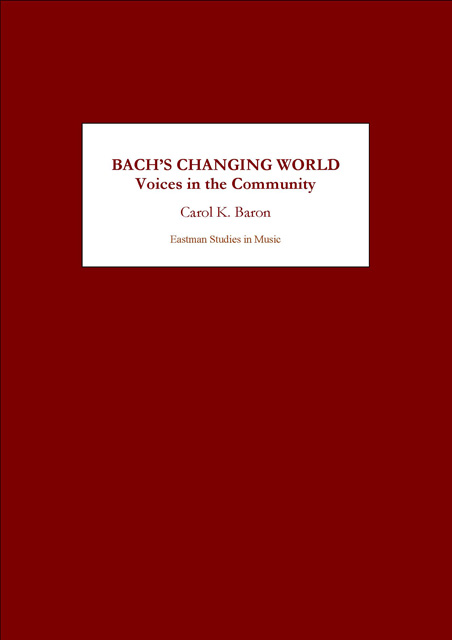Book contents
- Frontmatter
- Dedication
- Map
- Contents
- List of Illustrations
- Editor's Acknowledgments
- 1 Transitions, Transformations, Reversals: Rethinking Bach's World
- 2 Tumultuous Philosophers, Pious Rebels, Revolutionary Teachers, Pedantic Clerics, Vengeful Bureaucrats, Threatened Tyrants, Worldly Mystics: The Religious World Bach Inherited
- 3 Family Values and Dysfunctional Families: Home Life in the Moral Weeklies and Comedies of Bach's Leipzig
- 4 Bach in the Midst of Religious Transition
- 5 Bach's Situation in the Cultural Politics of Contemporary Leipzig
- 6 The Reception of the Cantata during Leipzig Church Services, 1700–1750
- 7 From Salon to Kaffeekranz: Gender Wars and the Coffee Cantata in Bach's Leipzig
- 8 A Treatise on Liturgical Text Settings (1710)
- 9 Random Thoughts About Church Music in Our Day (1721)
- Notes on the Contributors
- Index
- Eastman Studies in Music
5 - Bach's Situation in the Cultural Politics of Contemporary Leipzig
Published online by Cambridge University Press: 17 March 2023
- Frontmatter
- Dedication
- Map
- Contents
- List of Illustrations
- Editor's Acknowledgments
- 1 Transitions, Transformations, Reversals: Rethinking Bach's World
- 2 Tumultuous Philosophers, Pious Rebels, Revolutionary Teachers, Pedantic Clerics, Vengeful Bureaucrats, Threatened Tyrants, Worldly Mystics: The Religious World Bach Inherited
- 3 Family Values and Dysfunctional Families: Home Life in the Moral Weeklies and Comedies of Bach's Leipzig
- 4 Bach in the Midst of Religious Transition
- 5 Bach's Situation in the Cultural Politics of Contemporary Leipzig
- 6 The Reception of the Cantata during Leipzig Church Services, 1700–1750
- 7 From Salon to Kaffeekranz: Gender Wars and the Coffee Cantata in Bach's Leipzig
- 8 A Treatise on Liturgical Text Settings (1710)
- 9 Random Thoughts About Church Music in Our Day (1721)
- Notes on the Contributors
- Index
- Eastman Studies in Music
Summary
This study describes the negotiations over the appointment of a new cantor for the Thomasschule following Johann Kuhnau's death. The negotiations give a clear picture of the position that the Leipzig town councilors assigned to Bach within the cultural-political context of the time. They also shed light on the members of the Leipzig Town Council who were responsible for filling this position. Their deliberations take place within a specific political context, in which the town councilors were committed to factions created by the prevailing political forces functioning at that time: one protecting the city's prerogatives of selfgovernment that were rooted in the traditional system of estates, the other supporting the absolutist aims of the current electoral government. The author's recent article, “Bach and the Domestic Politics of Electoral Saxony,” describes the political structures in place in Saxony during the first half of the eighteenth century, which are represented by these factions, and how the tensions they created conditioned the fulfillment of Bach's vocational goals—both assisting and restricting them—while they may also have played a role in shaping Bach's music. As the members of the Leipzig Town Council sought appropriate candidates and deliberated on their qualifications, they articulated concerns that also included the complex philosophical and religious ramifications that emanated from this political situation.
When the appointment of a new cantor for the Thomasschule became necessary following Johann Kuhnau's death on June 5, 1722, there were two factions in the Leipzig Town Council. One faction desired to see the position of cantor filled along the lines of the traditional teaching post. The occupant of the office certainly should know music as well as possible, but he should be equally competent in the realm of academic instruction—a teacher and musician in one. I will call this faction the “Cantor faction.” The other faction wanted to see the position filled along the lines of a modern municipal music directorship. The occupant should be highly qualified, if possible even a musician with the highest possible qualifications, with skills as a composer, performer, conductor, and organizer. Furthermore, he should be exempted from the instructional responsibilities hitherto attached to the position in order to concentrate solely on music. I will call this faction the “Kapellmeister faction.”
- Type
- Chapter
- Information
- Bach's Changing WorldVoices in the Community, pp. 127 - 173Publisher: Boydell & BrewerPrint publication year: 2006



